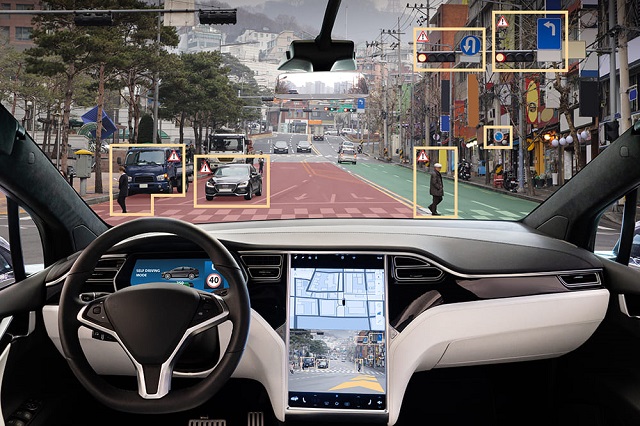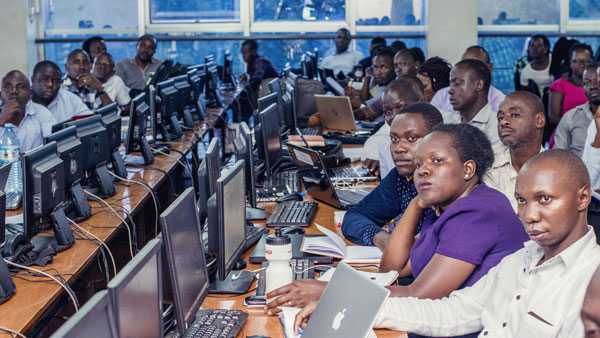
Why 78% of Ugandans say they would not feel safe in a car driven without a human at the steering wheel
SPECIAL REPORT | Ronald Musoke | Stephen, a 30 year-old bodaboda or motorcycle taxi rider in Kampala says he cannot allow to be driven in a car that is not manned by a human being; especially on Ugandan roads.
“For me, it must be a human being driving the car that is carrying me because, the understanding of that machine is not the same as a human being,” he told The Independent on Dec.15.
He added: “For the last 30 years I have lived, I have not seen anything like that and so changing my mindset is very difficult but it would be easier if this is taught to young children.”
Stephen is not alone in fearing Artificial Intelligence; a field of computer science where machines are programmed to learn and think like humans and mimic human actions, which has become an exciting field for computer scientists around the world.
It is based on the principle that human intelligence can be defined in a way that a machine can easily mimic it and execute tasks, from the most simple to the most complex, and has the potential to solve everyday chores like keeping homes secure or performing complex operations, such as those in the medical field.
When asked how they would feel being driven in a car without a human being at the steering wheel, 78% of Ugandans surveyed in a recent global poll said they would not feel safe while only 21% said they would feel safe. Compared to the rest of the world, 73% said ‘no’ or ‘don’t know’ while 27% agreed in the affirmative.
The findings are from a global survey published on Dec. 8 by a UK-based digital safety charity, Lloyd’s Register Foundation. Lloyd’s Register Foundation supports research, innovation, and education to make the world a safer place. Its survey shows the future challenges of AI adoption and acceptance by people from around the world.
It found that Ugandans are not the only people who are doubtful about the future of driverless cars. Just 27% of people around the world say they would feel safe, and in no country or region did more than 45% of people say they would feel safe.
The poll data shows that while trust in self-driving cars varies substantially around the world, more people in every country surveyed say they would not feel safe in a self-driving car than those who say they would feel safe. Denmark has the highest percentage of people who feel safe (45%), followed by UAE (44%), Afghanistan (44%), Italy (43%), Spain (41%), and Sweden (40%).
“It’s clear from this data that there is a low level of confidence in self-driving vehicles globally. AS automotive companies work to develop these vehicles, it is vital that regulation to ensure safety keeps pace so that people across the world can engage with these technologies—and reap their benefits—with greater confidence,” Dr. Sarah Cumbers, Director of Evidence and Insight at Lloyd’s Register Foundation.
Artificial Intelligence uptake
Technology companies and auto manufacturers have predicted the widespread adoption of automated driving systems for years, however, the Poll data shows that buy-in to autonomous vehicles continues to face challenges as people still have concerns about safety.
Driverless cars, also called self-driving cars or autonomous cars, are vehicles that use a combination of sensors, cameras, radar and artificial intelligence (AI) to travel between destinations without a human operator.
But even with these breakthroughs, there seems to be less enthusiasm for artificial intelligence among Ugandan and other East African citizens, according to the survey by Lloyd’s Register Foundation.

According to their findings, one in two (51%) respondents to the survey in East Africa says it would mostly harm people in their country over the next 20 years. According to the survey, Eastern Africa is the least hopeful region in the world when it comes to AI.
Fear of AI is an issue of concern because, computer scientists say, intelligent systems will take over more and more decision making tasks from humans in the coming decades as decision making will become more and more data-based than subjective and emotional.
“It’s for the betterment of human lives. In the medical field, for example, we now have robots that are doing complex operations; these operations cannot easily be done and would take extremely experienced medical personnel to perform,” Dr. Tyagi Vaibhav Bhushan; the Dean of the Faculty of Information and Communication Technology at ISBAT University in Kampala, told The Independent on Dec.15.
In fact, the field of AI is attracting interest in the country, especially among young people. At ISBAT University in Kampala, Dr. Vaibhav Bhushan told The Independent that the AI bachelor’s programme is among the most popular. Already, one of the students at the university has developed a programme to help visually impaired people in Uganda navigate their way when they walk, he said.
Inside the Makerere Artificial Intelligence Lab, an artificial intelligence and data science research group based at Makerere University, students under the tutelage of Dr. Joyce Nabende, are working on three areas; agriculture, health, and natural language processing.
In agriculture, AI has focused on a cassava project where researchers are helping in diagnosing post-harvest physiological deterioration (PPD) of cassava using images. The images taken of cassava leaves help to detect the deterioration at an early stage.
No other technology would be able to detect it at this stage. The project also incentivizes farmers by providing them with low cost Smartphones. The farmers use the phones to take photos and share with project managers.
In health, AI has developed a malaria diagnostic kit that uses a microscope and a smartphone. The kit solves the problem of lack of lab technicians. It uses 3D printable adapters to capture images of the microscopy through a smartphone. Then the project works with lab technicians who detect pathogens in the images. The malaria parasites are detected with more accuracy.
But, despite this optimism, results from the Lloyd’s Register Foundation survey among Eastern Africans showed the highest levels of distrust towards AI, with clear majorities answering that AI would instead harm people in their countries.
Respondents from Tanzania (62%), Kenya (57%) and Uganda (57%) had the highest percentages of people who said AI would mostly be harmful to people, while no more than 25% in these three countries said it would mostly be helpful.
The report, ‘A Digital World: Perceptions of risk from AI and misuse of personal data,’ is based on the 2021 Lloyd’s Register Foundation World Risk Poll, powered by Gallup. Close to 125,000 people across 121 countries including; Kenya, Tanzania and Uganda were polled about their attitudes towards AI and data, among other risk and safety issues.
Why Ugandans are terrified
In Uganda, a sample of 1,000 respondents was interviewed in October, last year, for this survey. The respondents were asked if they had used the internet, including social media, in the last 30 days on any device.
Amongst Uganda’s poorest, only 18% of the respondents said ‘yes.’ For those who identified as “rich,” 39% said ‘yes’ while 61% said ‘no.’ Responding to the question of: “When you use the internet or social media, how worried are you that the following things could happen to your personal information.
About 70% of Ugandans surveyed said they were either worried or somewhat worried about their personal information getting stolen while the rest (29%) said they are not worried.

Those who were worried or somewhat worried about their personal information being used by the government without their permission were 73% while 26% said they were not worried. Those worried about their personal information being used by commercial enterprises for marketing purposes without their permission were 66% while those who seemed unbothered were 34%.
When asked what they thought about artificial intelligence in the next 20 years; 54% of respondents said AI would mostly harm Uganda while 25% were positive it would be helpful. About 15% did not know whether it would be helpful or not.
East African pessimism explained
The pessimism in East Africa, according to the report, is due to the level of exposure people in the region have towards AI technology through internet access and education.
For instance, the poll found that only 29% of Eastern Africans had used the internet in the past 30 days, which is 34 percentage points lower than the global average (63%). It also found that people with primary education or less still represent the majority in Eastern Africa, at 55%.
“Artificial intelligence has huge potential to bring good to the world, and we’re already seeing some of its benefits within healthcare, disaster risk management and government services,” said Dr Sarah Cumbers, “However, if we don’t engage the public with the development of these technologies and address their concerns, we may fail to introduce them in a way that is accepted by the majority.”
Dr Cumbers noted that among the reasons why citizens in eastern Africa associate artificial intelligence with harm is the lack of exposure to these technologies.
“Those who are not regularly exposed to AI technology, whether through internet access, work or education, seem to have less optimism about its potential benefits and therefore show a higher level of distrust. There may also be a level of worry around people losing their jobs as a result of potential automation of some processes.”
“It’s essential that governments, policymakers and other actors within the system engage with the population to address their concerns and ensure the benefits of AI technology can be realised equitably.”
This is the second edition of the Poll, based on around 125,000 interviews conducted by Gallup in 121 countries during 2021. The data includes places where little or no official data on safety and risk exists, and so constitutes a unique resource for defining the nature and scale of safety challenges across the world, as reported first-hand by those who experience them.
Albert Buhunge, a Kampala-based IT solutions expert told The Independent that it is not surprising that the people surveyed in Uganda are skeptical about AI. “Human beings generally fear what they don’t understand,” he said.
Buhunge told The Independent that even for societies that have quickly adopted AI, some people are not comfortable with how intrusive some of the applications can get into their lives. “So I understand why people in East Africa are doubtful about AI.”
Buhunge told The Independent that people who view AI with only positive lenses are being short-sighted. He mentions hackers who are on the loose to abuse data as one of the biggest threats. “Data security is a real concern for so many people around the world.”
AI change happening
Going forward, experts The Independent talked to say, the pensive attitude towards AI in Uganda can only change with massive sensitisation.
“No doubt, we are going to need AI in future because it has many uses in today’s world,” Buhunge told The Independent, “So, sensitizing people about how AI works would be a good starting point.”
“AI is a good slave but also a bad master; it has its advantages and disadvantages.” “It is, for instance, good at performing data intensive but also repetitive tasks; jobs that human beings would find cumbersome or boring but it can also be abused by people with ill intention.”
Dr. Vaibhav Bhushan also told The Independent that it is indeed necessary to do a “literacy campaign” to popularize AI in countries like Uganda.
“People who are literate know how to respond to AI but illiterates normally struggle and it’s understandable for such people to be doubtful about AI,” he said.
“For example, the ATM at your bank uses a bit of AI but if you don’t know how to respond to the queries, one would be terrified; so awareness is important and ordinary people must be sensitized to know about what is going on in the world including the availability of new technologies and new trends in the market.”
“These days it is also normal for the average traveller to book and pay for their air ticket online but someone in your village would be doubtful about where their money is going,” he says, “That is because they have not used this technology. But if they get educated about how the system works and they have even seen one or two examples from their peers, they will fear less.”
Usage of internet is growing, explains Dr. Bhushan. “Nowadays, almost everyone has a Smartphone and soon 4G and 5G technology will reach every part of the country and even those people who are in the villages will get internet and they will have accessibility to internet.”
He says when the internet revolution eventually gets to the remotest corners of the country; the prices of gadgets like mobile phones, tablets and laptops will naturally drop and once these gadgets are accessible, usage will increase and the phobia will dissipate. Dr. Vaibhav Bhushanreckons it will take less than 20 years for the things he is talking about to happen in Uganda.
 The Independent Uganda: You get the Truth we Pay the Price
The Independent Uganda: You get the Truth we Pay the Price



